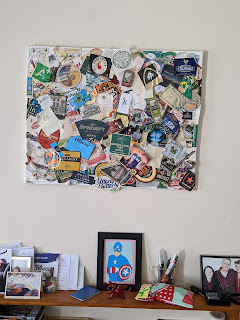Stuff 5 - A Few Good Nights:
Ok so having been told off by my Mother for two Blogs in a row, I thought I should move to safer ground in subject terms. Today’s item is a Collage that is currently hanging in my Living Room. It's called "A Few Good Nights" It is literally the product of the time a few years ago, when my house for a while became the place where my friends would congregate. Mostly because a few of us had kids of a similar age & consequently had little time or money to go to somewhere as exotic as a pub very often. You never realise how rich you were, until you have kids. Being the crowd that we were, there was always something new someone had found for us all to try, it became a bit of a voyage of discovery at times. We got into the habit of sticking the labels of a beer we enjoyed, or even a whiskey that we thought was fowl, both worthy of a place because they were enjoyed or laughed about at the time. The wrapper of the Cuban Cigar I shared with Phil, along with the label of the bot...




Comments
Post a Comment